
Features
Aggregates
Profiles
Expanding Markets
Polaris Materials looks south to California customers
November 27, 2014 By Peter Caulfield
Vancouver-based Polaris Minerals Corporation recently started building
an aggregates receiving terminal in the Port of Long Beach to serve the
Los Angeles basin market in Southern California.
Vancouver-based Polaris Minerals Corporation recently started building an aggregates receiving terminal in the Port of Long Beach to serve the Los Angeles basin market in Southern California.
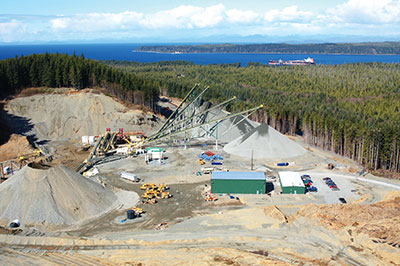
|
|
Construction of the terminal, which began in July, 2014, is scheduled to be completed by the end of 2014. It will be operated by Eagle Rock Aggregates Inc., Polaris’s U.S. distribution subsidiary.
Polaris, which owns an aggregates quarry in British Columbia, is building on its success in the northern California market.
“Our aggregates are the lowest-cost in the San Francisco area,” said Herb Wilson, director, president and CEO of the company. “That’s because the cost per ton-mile of moving aggregates 1,000 miles by water from B.C. to San Francisco is about the same as the cost of shipping aggregates 25 miles by truck on California highways.”
The company’s eight-acre Long Beach site, which was leased in 2010 under a long-term agreement, is the only permitted aggregates receiving terminal in the port.
Because the site had previously handled only barges, Polaris had to obtain permits that would enable delivery of its products in large, ocean-going self-discharging vessels before it could begin construction.
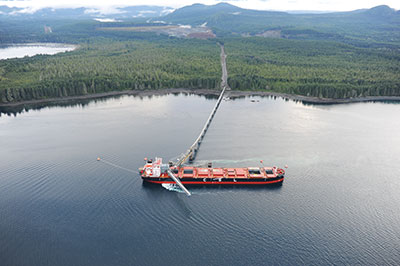 |
|
| Orca Quarry shiploading berth with 80,000 ton Panamax ‘Rt. Hon. Paul E. Martin’ loading.
|
In addition to the Long Beach terminal, Polaris has other construction aggregates interests on the west coast. They are an 88 per cent ownership in the Orca Sand and Gravel Quarry on Vancouver Island; a 70 per cent ownership in the Richmond Terminal in California, which receives and distributes the Orca products; and a 70 per cent ownership in the Eagle Rock Quarry Project, also on Vancouver Island.
Polaris was founded in 1999 to search for mineral deposits in B.C. In 2007, the company completed construction of the Orca Quarry, a greenfield site located near Port McNeill on Vancouver Island, and began shipping sand and gravel to San Francisco.
Mineral extraction at the Orca Quarry, which has a capacity of 6.6 million tons per year, occurs in phases, moving from north to south. Extraction takes place up to a depth of approximately 200 feet and only above the groundwater table. The pit operation has been designed to enable gradual land reclamation to begin once the quarry’s resources have been depleted.
Wilson says the method of extraction used by Polaris is unique in the aggregates industry.
“We use scrapers to extract deposits,” he said. “We have three CAT 637G scrapers, and they are supported by a CAT dozer and a CAT wheeled loader.”
After the sand and gravel have been extracted, they are fed into a custom-designed processing plant that was built by the Finnish company Metso.
The processing plant produces three washed products: large (1 inch) gravel, small (1/2 inch) gravel and concrete sand.
Process wash water is obtained from onsite boreholes and reclaimed through a filtration system and recirculated. The very fine sand processed through the washing and filtration process is removed as a cake and used for land reclamation, where it is a valuable soil additive.
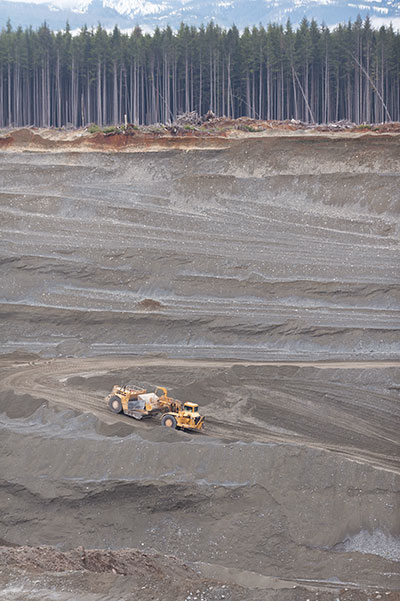
|
|
| The Orca Quarry is the only one in North America that uses large tandem scrapers to excavate the deposit, which is 200+ feet deep and in two distinct horizons that need blending together.
|
Four large product stockpiles can hold up to 600,000 tons of inventory above a computer-controlled conveyor reclaim system that enables automatic ship loading at a rate of up to 5,000 tons per hour.
The ship loader was designed by Seabulk Systems Inc. of Richmond, B.C., and was built by Ramsay Machine Works Ltd. of Sidney, B.C.
To ship the aggregates from British Columbia to California, Polaris has a 20-year shipping agreement with CSL International Inc., which operates the world’s largest fleet of self-discharging bulk carriers.
Production at the Orca Quarry has gone smoothly.
“Our operation runs on the three pillars of sustainability – economic, social and environmental,” Wilson said. “Orca contributes to the economic strength of northern Vancouver Island through the millions of dollars we spend locally each year on payroll, taxes and goods and services.”
Social sustainability recognizes that the quarry workers are a diverse group.
“At least one-half of our employees are First Nation, approximately one-third are female and all are local to the area,” said Wilson.
An environmental management system modelled on the ISO 14001 standard was developed for Orca Sand and Gravel by an environment specialist, to ensure that any impact on the local environment is monitored and controlled.
“The system ensures that the forestry operations that were present before the quarry was developed will be gradually re-established through progressive
reclamation and without any adverse impacts on the marine environment,” Wilson said.
Polaris has made an effort to minimize its impacts on the environment in a number of ways.
“We heat our buildings with furnaces that run on waste oil and use a modern filtering system to reclaim oils,” Wilson said. “We also collect all of our other wastes and dispose of them safely off-site.”
Polaris also has what Wilson calls “respectful relationships” with “our indigenous partners.”
“Our business was developed through positive, open and respectful communication with indigenous populations,” he said. “That communication began with the acknowledgement of their aboriginal rights.”
Wilson says the company respects the rights, diversity and heritage of indigenous peoples and their connection with the land.
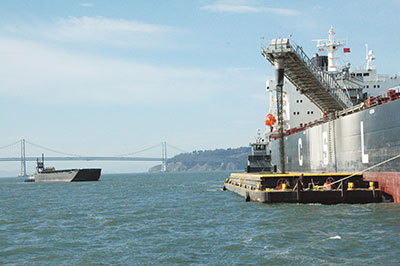
|
|
| The key to Polaris’s logistics is its ability to take the first 20,000 tons off the Panamax ships into smaller barges while at anchor in San Francisco Bay. The Bay has relatively shallow water but after lightering the ship is higher in the water and can then access one of three land based terminals that we supply.
|
“Each subsidiary company has directors representing the First Nation partners, which ensures a continuation of our open relationship with them as the business develops,” he said.
Polaris has a number of steady customers. In 2008, it formed a strategic alliance with Cemex USA Inc., a large international construction materials company. The deal made Polaris the exclusive supplier of marine-transported aggregates to Cemex in northern California.
Polaris also has a long-term supply agreement with Shamrock Materials Inc. and Hauser Concrete Aggregates in California, and multi-year contracts with customers in Vancouver and Hawaii.
Wilson says Orca Quarry aggregates are highly regarded in California.
“The customers love our products,” he said. “Orca aggregates are hard and durable and high-quality. They were used in the concrete that is in the foundations and piers of the new eastern span of the San Francisco – Oakland Bay Bridge, which was finished in 2013.”
According to Polaris, the sand and gravel produced at Orca exceed the requirements of the specifications of both the California Department of Transportation and the American Society for the Testing of Materials.
The destination of most Orca Quarry products is Polaris’s Richmond Terminal. Located in the Port of Richmond, California, the aggregate receiving, storage and distribution facility serves the northeastern San Francisco Bay area. It is permitted to handle 1.5 million tons of construction aggregates per year.
“It takes two-and-a-half days for our ships to make the journey from Vancouver Island to San Francisco Bay,” Wilson said. “Because the ships are so large and their loads are so heavy, the first 20,000 to 25,000 tons are unloaded onto barges before the ships are able to enter the Richmond terminal, where the rest is unloaded.”
About one-half of all aggregates that are unloaded in San Francisco Bay are used on the dock areas to make cement. The rest is shipped by truck to customers in the region.
In addition to its Orca operation, Polaris owns 70 per cent of the proposed Eagle Rock Quarry, a large granite resource located near Port Alberni, Vancouver Island, which the company plans to develop in the future “when market conditions allow.”
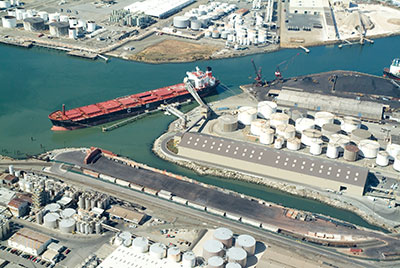 |
|
| Panamax delivering to Richmond Terminal, San Francisco Bay.
|
The 30 per cent minority interest in Eagle Rock Materials Ltd., the subsidiary company that owns the rights to the project, is divided equally between the Hupacasath and Ucluelet First Nations.
“In addition to supplying granite aggregate for use in road building, production from Eagle Rock will be required in the future to provide coarse aggregate to complement the sand-rich Orca Quarry deposit,” Wilson said.
Looking ahead, Polaris is counting on being able to capitalize on the continuing decline in Polaris’s target markets of local aggregate resources.
“The traditional quarries are being worked out, and replacement quarries are difficult, if not impossible, to get a permit for,” Wilson said. “The decline in indigenous resources will require significant volumes of imported materials to meet projected levels of demand.”
Wilson says that as sales begin to reach six million tons per year at the Orca Quarry, the Eagle Rock Quarry is expected begin granite production.
“That way, Polaris will be able to meet continuing demand for aggregate that is used to make concrete, and also to enter into the road construction market, where crushed rock, rather than sand and gravel, is what is required.”
Print this page